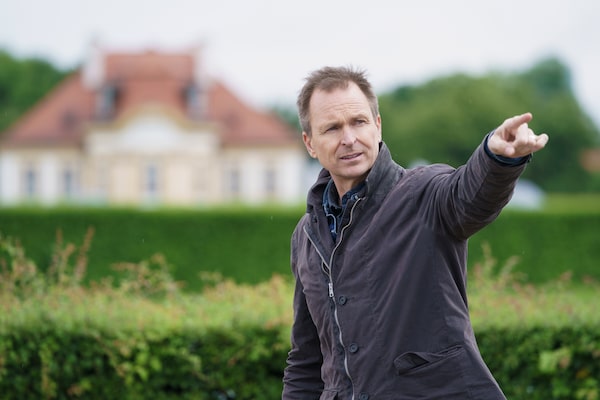
Phil Keoghan hosts The Amazing Race, a series built around international travel with more than a dozen regional spin-offs, including The Amazing Race Canada.KIT KARZEN
For almost 25 years, Phil Keoghan lived within driving distance of LAX, and got used to being able to hop on a plane and fly 13 hours from the California airport to his native New Zealand. Then the pandemic hit, and like the rest of us, the host of The Amazing Race was stuck in place. Even when his mother got sick, New Zealand’s tight entry restrictions meant he couldn’t visit.
“Knowing that I couldn’t just get on a plane and go home, it was really claustrophobic,” Keoghan, 55, told The Globe and Mail. “It made me realize I had taken this ability for granted and gives me an understanding of how lucky I was to be able to do that.”
The Amazing Race – on air since 2001, with more than a dozen regional spin-offs, including The Amazing Race Canada – is built around international travel. Teams race across the world, exploring far-flung destinations and competing in challenges to win a prize of US$1-million. Since its beginning, the show has aired almost two seasons a year, but COVID-19 forced an 18-month gap in production last season. When filming resumed, several teams were unable to participate, and those remaining were restricted to racing around a handful of countries deemed safe by broadcaster CBS.
On Sept. 21, Season 34 premieres with the show’s 400th leg in Munich, Germany. Things aren’t completely back to normal: The race is still largely confined to continental Europe, with sojourns to Jordan and Iceland, and travel is done on a chartered Boeing 757-200 rather than commercial flights.
“We had to make some adjustments, but you work with what you have, right?” Keoghan said. “The fact we could actually get out and have a show is what you’ve got to focus on, rather than what the downside is.”
With the world gradually reopening, a new season of The Amazing Race would seem perfectly timed, both escapism and inspiration for people getting used to going overseas again. But COVID-19 did more than just keep us in place; it also raised questions about the purpose and value of travel – particularly air travel – at a time when people are becoming increasingly aware of their environmental impact.
“As you cut out travel and kind of start building it back up from essentially nothing, it becomes really clear that taking a flight from New York to Chicago for a lunch meeting is probably not worth it,” said Sam Denby, creator of Jet Lag: The Game. “It has really exposed how we have to rejustify each form of travel as we built it back up again, and what sort of travel is truly unnecessary and frivolous.”
Like The Amazing Race, Denby’s show, which airs on YouTube and premiered during the pandemic, is also structured on an around-the-world race. The 24-year-old said he was inspired by the CBS show, “which has been going the vast majority of my life.” But The Amazing Race is, he said, “essentially a traditional reality show shoved into the travel context; you do these big produced challenges and that’s what kind of drives the competition.”

Sam Denby, left, and other contestants on season one of Jet Lag: The Game, a travel competition show that airs on streaming service Nebula and YouTube.
“We wanted to flip that, we realize you can be good at travel and bad at travel, that you can do a better and quicker job at optimizing your routes, or navigating a city in a foreign country,” he added. While it does feature additional challenges, the drama of Jet Lag often comes from whether a team will make a connecting flight in time, or have enough money to buy the ticket that could win them the game.
Another key difference is the show foregrounds its environmental impact, by displaying prominently the amount of carbon offsetting done to make up for any air travel. Denby, who has made numerous videos about climate change and carbon offsetting (including that most solutions are ineffective at best and scams at worst), said, “We knew from the get go that we would get some criticism for what is clearly somewhat frivolous travel.”
“Given it was necessary for this concept, there really wasn’t a way around it, so this was the best option to enable us to do the show but also minimize the very real carbon emissions,” he said.
He researched various options and settled on Gold Standard, a platform co-founded by the World Wildlife Fund. Any programs it features conform to standards higher than those set by the United Nations, and to ensure margin for error, “we offset 10 times more carbon than we were estimated to emit,” Denby said. But while he was keen to reduce the environmental impact of his show, he adds, “Overall, I think travel is a good thing, and the world is a better place for travel.”
“Of course, there’s a big downside which is carbon, but there are huge upsides in terms of people’s understandings of foreign cultures, and in how tourism drives economies,” Denby said.

Ben Doyle, left, and Adam Chase, contestants in and co-creators of Jet Lag: The Game, take part in a challenge to build a go-kart in Milan, Italy.
Keoghan said he was encouraged by the growing awareness of our personal impact and need to mitigate it, such as by focusing on local travel. He pointed to a campaign New Zealand ran as far back as the 1980s – “Don’t leave town till you’ve see the country.” “It’s about looking at what’s in our own backyard first,” he said, and also making sure that when we do travel internationally, it’s for a good reason: that we connect with local cultures and get new experiences, rather than just sit in a hotel “that once you’re inside could be Pasadena or could be Istanbul.”
The Amazing Race has always featured non-air-travel, and Keoghan said he felt the show should do more of that. Denby said Jet Lag was also looking to highlight alternatives to planes. The next season, which begins airing Sept. 14 on YouTube, “is an almost entirely train-based season,” Denby said, showing that trains are a great way to travel and more should be available. He was keen however to emphasize that we shouldn’t focus too much on personal responsibility, “a straw man for what the real solution to climate change is, which is broad, systemic change from the top.”
Now a perennial concern for many travellers, the term “carbon footprint” was originally popularized by an advertising campaign funded by oil giant BP. Climate scientist Michael Mann has argued such efforts, which resulted in a “fixation on voluntary action,” may have actually undermined more concerted governmental efforts. “When the climate discourse devolves into a shouting match over diet and travel choices, and becomes about personal purity, behaviour-shaming and virtue-signalling, we get a divided community unable to speak with a united voice,” he writes in The New Climate War. “We lose. Fossil fuel interests win.”
One of the paradoxes of the pandemic was that, as we were cut off from each other by travel restrictions, the world never felt smaller, with everyone on the planet affected by a single crisis. The climate catastrophe is the same, even if its effects are often unfairly distributed, and while travel game shows might seem at first glance to be the epitome of frivolous, carbon-heavy activity, they also speak to a common desire and pleasure shared by everyone on the planet.
“Travel is how you connect with different cultures, and connecting with different cultures is a key part of how we’re going to preserve this planet,” Keoghan said. “We’re not stuck on an island that isn’t affected by everyone else.”
Keep up to date with the weekly Sightseer newsletter. Sign up today.
 James Griffiths
James Griffiths